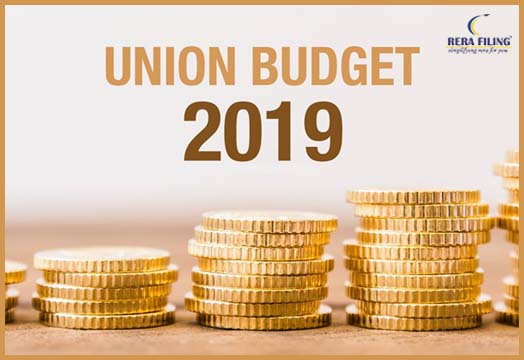Union Budget 2019 impact on Real Estate Sector

- General
- Author: Shreya Uppal
Highlights
Additional deduction up to Rs. 1.5 lakhs for interest paid on loans borrowed up to 31st March 2020 for purchase of house valued up to Rs. 45 lakh.
1.95 crore houses from F/Y 20-22 will be constructed under PMAY (Pradhan Mantri Awaas Yojana).
Rental laws to be reformed. Modern tenancy law will be shared with states to promote house renting.
The base year has been shifted to 2001 from 1981
A much longer wait of the Union Budget 2019 has been over and the First Female Finance Minister Mrs. Nirmala Sitharaman has presented the budget for 2019-2020 on 5th July at 11.00am in the Lok Sabha. Breaking away from the brown Budget briefcase, she held a red parcel like a bag with a keyhole on the emblem denoting free from Western Slavery.
With the much-expected results, the Government in Budget 2019 has announced to continue its aim with “Affordable Housing”.
Some highlighted points for the Real Estate Sector in the Budget 2019:
1. Keeping in mind she quoted “Gaon, Garib, and Kisan at the center”, she proposed that 1.95 crore houses from F/Y 20-22 will be constructed under PMAY (Pradhan Mantri Awaas Yojana).
2. Further, the FM also made a note that the time for completion of houses under PMAY was reduced from 314 days in 2015-2016 to 114 days in 2017-18, enabling the scale of achievement in PMAY providing all basic amenities such as LPG, electricity, and toilets. Also Read:- Expectations of Real Estate Sector from Budget 2019
3. Rental laws to be reformed. Modern tenancy law will be shared with states to promote house renting. Currently, the high cost of houses and high property taxes lead to a low rate of return (ROR) from rental housing, making renting out an un-remunerative proposition. The new model tenancy is expected to balance the rights and responsibilities of both landlords and tenants that will make the rental market more efficient and streamlined across the country.
4. Additional deduction up to Rs. 1.5 lakhs for interest paid on loans borrowed up to 31st March 2020 for purchase of house valued up to Rs. 45 lakh. This will be in addition to the existing interest deduction of Rs 2 lakh.
5. Budget 2019 has proposed to levy Tax Deduction at Source (TDS) of 2% on Cash Withdrawal of more than Rs.1 crore from a bank account in one financial year to discourage business payments in cash.
6. In order to align the definition of affordable housing in the Income-tax Act with GST Act, the Finance Minister proposed to increase the limit of carpet area from 30 square meters to 60 square meters in metropolitan regions and from 60 square meters to 90 square meters in non-metropolitan regions.
7. For the realization of the goal of ‘Housing for All’ and affordable housing, the FM announced a tax holiday on profits earned by developers of affordable housing.
8. The base year for holding period to calculate long-term gains from the immovable property has been shifted to 2001 from 1981. The holding period for calculating the long-term gain on the immovable property was reduced from 36 months to 24 months.
9. The safe harbor of 5 percent on stamp duty value was provided for the purpose of computation of capital gains on immovable property.
10. Former Finance Minister Piyush Goyal in his interim budget 2019 speech had announced exemption from income tax on the notional rent from second house property. In addition to that, one can also invest capital gains of up to Rs 2 crore arising from the sale of the house in two house property instead of one, as per the interim budget. However, this benefit is available only once in a lifetime.
We all hope that the Modi Mantra of Reform, Perform and Transform soon converts the Indian Economy into a $5 Trillion economy and the goal of 1 Nation, 1 Grid Affordable Power to all the states soon come into the reality.
Tags:- Expectations of Real Estate Sector from Budget 2019, GST, carpet area, Rental laws
Latest Blogs
- Rights of buyer under RERA
- Delhi RERA Agent Procedure for Re-validation or Renewal
- MahaRERA guidelines for Real Estate agent training and certification
- Force Majure Clause in RERA
- All you need to know about Relinquishment Deed
- RERA Agent Renewal in Maharashtra
- What is Title Verification and Search Report?
- Revocation under the RERA Act
- RERA Limitations
- Homebuyers right in case of insolvency
Copyright © 2023 RERA Filing. All rights reserved.
 Rera
Act
Rera
Act
 Maharashtra
Maharashtra Karnataka
Karnataka Andhra Pradesh
Andhra Pradesh Uttar Pradesh
Uttar Pradesh